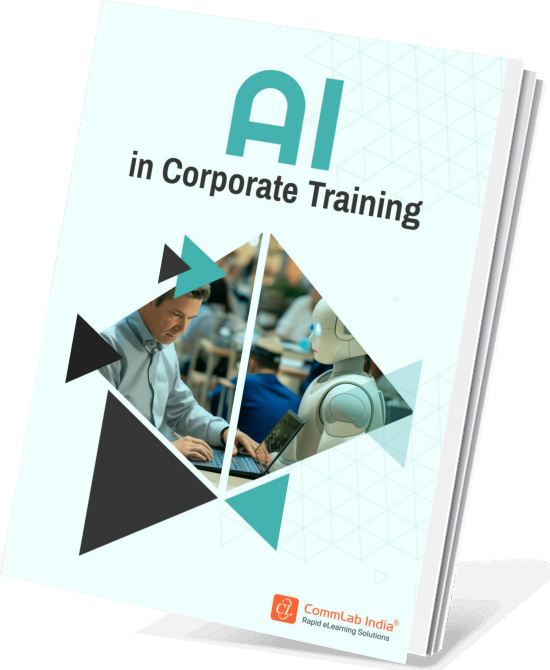How is AI Upping the Custom eLearning Design and Development Game?

The corporate landscape is in a state of constant flux, driven by technological advancements, globalization, and shifting market dynamics. To thrive in this competitive environment, organizations must invest in their workforce's development. Custom eLearning, tailored to meet the specific needs of an organization, offers a powerful solution for delivering targeted and impactful training experiences. By aligning training content with organizational goals, custom eLearning can enhance employee performance, boost productivity, and foster a culture of continuous learning.
→ Download eBook: AI in Corporate Training
Artificial intelligence (AI), once relegated to the realm of science fiction, has become a transformative force in various industries. Its influence on eLearning design and development is undeniable. AI-powered technologies can revolutionize the way custom eLearning content is created, delivered, and personalized, leading to more engaging, effective, and scalable training solutions.
This blog aims to critically analyze how AI is transforming custom eLearning. We will explore the key benefits of AI-powered eLearning, examine the technologies driving this transformation, and discuss the challenges and considerations for organizations seeking to implement AI in their training programs. By understanding the potential of AI in custom eLearning, organizations can position themselves for success in the competitive landscape of today's corporate world.
Table of Contents
- What are the Key Benefits of Custom eLearning for Corporate Training?
- How is AI Enhancing Custom eLearning Design and Development?
- What are the Challenges and Ethical Considerations?
How is AI Enhancing Custom eLearning Design and Development?
Here a glimpse of the benefits:
- Personalized Learning Experiences
- Rapid Content Development
- Intelligent Tutoring Systems
- Automated Assessments and Feedback
What are the Key Benefits of Custom eLearning for Corporate Training?
1. Personalization and Relevance: The Power of Custom eLearning
Custom eLearning offers organizations the unique opportunity to tailor training content to meet their specific needs. By aligning training with organizational goals, companies can ensure that employees receive the most relevant and impactful learning experiences. This personalization fosters a culture of continuous learning and development, driving employee engagement and performance.
Examples of Personalized Learning Paths and Adaptive Learning
- Role-based training: Custom eLearning can be designed to cater to the specific needs of different roles within an organization, ensuring that employees receive the training they need to excel in their positions.
- Skill-based training: For organizations with a focus on skill development, custom eLearning can be used to create targeted training programs that address specific skill gaps.
- Adaptive learning: Modern adaptive learning platforms can personalize the learning experience for each individual employee, adjusting the content and pace of learning based on their progress and performance.
- Personalized learning paths: Custom eLearning can be designed to create personalized learning paths that guide employees through the training content, ensuring that they receive the most relevant and effective information.

By leveraging the power of personalization, custom eLearning can create a more engaging and effective learning experience for employees, driving improved performance and organizational success.
2. Flexibility and Accessibility: The Benefits of Custom eLearning
Custom eLearning offers unparalleled flexibility and accessibility, allowing employees to learn at their own pace and convenience. This is particularly valuable for organizations with geographically dispersed workforces or employees with busy schedules.
- Anytime, Anywhere Learning: Custom eLearning modules can be accessed from any device with an internet connection, enabling employees to learn anytime, anywhere. This flexibility allows employees to fit training into their schedules, whether it's during their commute, lunch break, or after work hours.

AI in Corporate Training
Partner, Not Replacement
- AI in Corporate Training
- AI Toolkit for Super-charged Learning
- Challenges to Consider with AI Implementation
- And More!
- Self-Paced Learning Modules: Custom eLearning modules can be designed to accommodate different learning styles and paces. Employees can progress through the training at their own speed, allowing them to focus on areas where they need more support and move quickly through topics they already understand. This self-paced approach can enhance learning outcomes and improve employee satisfaction.
Additional Benefits of Flexibility and Accessibility
- Reduced Training Costs: Custom eLearning can reduce training costs by eliminating the need for travel, accommodations, and instructor fees.
- Improved Employee Morale: Flexible learning options can improve employee satisfaction and morale by empowering them to take control of their professional development.
- Increased Productivity: By allowing employees to learn at their own pace and convenience, custom eLearning can help improve productivity and reduce downtime.
3. Cost-Effectiveness of Custom eLearning
Custom eLearning provides considerable cost advantages over conventional training approaches. By removing the expenses associated with travel, lodging, and instructor fees, organizations can lower their total training costs.
- Reduction in Travel and Accommodation Costs: Traditional training methods often require employees to travel to attend in-person sessions, incurring costs for transportation, accommodations, and meals. Custom eLearning eliminates these expenses, allowing organizations to allocate resources more effectively.
- Reusable Learning Materials: Custom eLearning materials can be reused multiple times, reducing the need for ongoing content development. This can lead to significant cost savings over time, especially for organizations with large workforces or frequent training needs.
Additional Cost Benefits
- Improved ROI: Custom eLearning can deliver a higher training return on investment (ROI) by ensuring that employees receive the most relevant and effective training.
- Reduced Time Off: By eliminating the need for employees to travel for training, custom eLearning can reduce the amount of time employees spend away from their jobs.
- Increased Productivity: Custom eLearning can help improve employee productivity by providing access to training when employees need it most.
Use Cases of Custom eLearning in Corporate Training
Custom eLearning offers a versatile and effective solution for addressing a wide range of training needs within corporate environments. Here are some common use cases:
1. Employee Onboarding
Onboarding new employees is a critical process that sets the tone for their entire tenure with an organization. Custom eLearning can streamline the onboarding process by providing interactive modules that introduce new hires to company culture, policies, and procedures.
Case Study: Streamlined Onboarding
Here is a case study about CommLab India’s work with a global biopharmaceutical company. The pharma company faced the challenge of developing an engaging onboarding training program that would be consistent across locations. We proposed an eLearning solution with a LEAD strategy, allowing learners to explore the company’s mission, values, culture, structure, leadership, therapeutic areas, and products. Explore more here: A Case Study on New Hire Onboarding for a Global Biopharma Major.
2. Compliance Training
Ensuring that employees are up-to-date with industry regulations and company policies is essential for maintaining compliance and mitigating risks. Custom eLearning can be used to deliver effective compliance training that is tailored to the specific needs of an organization.
Example: Interactive Compliance Scenarios
A healthcare provider can create custom eLearning modules that simulate real-world compliance scenarios, allowing employees to practice applying relevant regulations and policies in a safe and controlled environment. This can help employees develop the skills and knowledge necessary to prevent compliance violations.
3. Skill Development and Upskilling
Custom eLearning can provide employees with ongoing learning opportunities to develop new skills and stay up-to-date with industry trends. This can help employees advance in their careers and contribute more effectively to the organization's success.
Additional Use Cases
- Product Training: Custom eLearning can be used to train employees on new products or services, ensuring that they have the knowledge and skills necessary to sell and support them effectively.
- Leadership Development: Custom eLearning can be used to develop leadership skills, such as communication, decision-making, and team building.
- Customer Service Training: Custom eLearning can help employees improve their customer service skills, leading to increased customer satisfaction and loyalty.
- Safety Training: Custom eLearning can be used to deliver safety training, ensuring that employees are aware of potential hazards and know how to prevent accidents.
How is AI Enhancing Custom eLearning Design and Development?
1. Personalized Learning Experiences
AI is revolutionizing custom eLearning by enabling personalized learning experiences. By analyzing learner data, AI algorithms can identify individual strengths, weaknesses, and learning styles, allowing for tailored content delivery.
Tailored Content Delivery:
eLearning platforms powered by AI can monitor student progress, pinpoint where extra assistance is required, and suggest appropriate resources. This tailored method guarantees that learners get the most beneficial guidance and can advance through their training at a pace that suits them.
Adaptive Learning Systems:
These utilize AI to modify the training difficulty and speed according to a learner's performance, ensuring that individuals are appropriately challenged without feeling overwhelmed, which results in a more engaging and effective learning process.
Benefits of Personalized Learning
- Increased Engagement: Personalized learning experiences are more likely to capture learners' interest and keep them motivated.
- Improved Knowledge Retention: Tailored content helps learners better understand and retain information.
- Enhanced Learning Outcomes: Personalized learning can lead to improved learning outcomes and better performance on the job.
- Reduced Time to Proficiency: Adaptive learning systems can help learners achieve proficiency more quickly by adjusting the training to their individual needs.
Examples of Personalized Learning in Action
- Adaptive quizzes: AI-powered quizzes can adjust the difficulty of questions based on a learner's performance, ensuring that learners are challenged but not overwhelmed.
- Personalized learning paths: AI can recommend tailored learning paths based on a learner's interests, goals, and previous knowledge.
- Real-time feedback: AI-powered tools can provide learners with real-time feedback on their performance, helping them identify areas for improvement.
By leveraging AI to create personalized learning experiences, organizations can enhance the effectiveness of their custom eLearning programs and drive better business outcomes.

AI in Corporate Training
Partner, Not Replacement
- AI in Corporate Training
- AI Toolkit for Super-charged Learning
- Challenges to Consider with AI Implementation
- And More!
2. Rapid Content Development
AI is revolutionizing the way custom eLearning content is created, allowing organizations to develop high-quality training materials more quickly and efficiently. AI-powered authoring tools can automate many of the repetitive tasks involved in content creation, freeing up L&D professionals to focus on more strategic aspects of course design.
AI-Powered Authoring Tools:
AI-powered authoring tools can streamline the content creation process by:
- Automating content generation: These tools can generate basic content, such as quizzes, scenarios, and branching logic, based on predefined templates and data.
- Providing intelligent suggestions: Authoring tools can suggest relevant content, images, and videos based on the topic being covered.
- Simplifying the design process: These tools can help create visually appealing and engaging eLearning modules with minimal design expertise.
Reducing Development Time:
By automating repetitive tasks, AI-powered authoring tools can significantly reduce the time it takes to develop custom eLearning content. Studies have shown that these tools can reduce development time by 30-40%.
Benefits of Rapid Content Development
- Faster Time to Market: AI-powered authoring tools can help organizations get new training programs into the hands of employees more quickly.
- Reduced Costs: By streamlining the content creation process, AI can help reduce the overall cost of custom eLearning development.
- Increased Agility: AI-powered authoring tools can help organizations respond more quickly to changing business needs and industry trends.
How AI can Generate Game-Changing Content for Corporate Training?
Examples of AI-Powered Authoring Tools
- Articulate Rise: This tool uses AI to suggest content, images, and videos based on the topic being covered, making it easier to create engaging and interactive eLearning modules.
- Adobe Captivate: This tool offers a variety of AI-powered features, including automated content generation and intelligent suggestions.

By leveraging AI-powered authoring tools, organizations can accelerate the development of custom eLearning content, ensuring that employees have access to the training they need to succeed.
3. Intelligent Tutoring Systems
These are AI-powered tools that can provide real-time, personalized support to learners. By analyzing learner data and adapting to their individual needs, ITS can enhance the effectiveness of custom eLearning programs.
Real-Time, Personalized Support:
ITS can provide learners with instant feedback and assistance, helping them overcome challenges and stay motivated. This personalized support can be particularly valuable for complex topics or learners who may struggle with certain concepts.
Example: AI Tutors Providing Instant Feedback and Assistance
A company can implement an ITS that provides real-time feedback on learner performance during quizzes or simulations. The ITS can identify areas where the learner is struggling and offer targeted support, such as additional explanations, examples, or practice exercises.
Benefits of Intelligent Tutoring Systems
- Improved Learning Outcomes: ITS can help learners achieve better learning outcomes by providing personalized support and guidance.
- Increased Engagement: ITS can make learning more engaging by providing real-time feedback and interactive experiences.
- Reduced Time to Proficiency: ITS can help learners achieve proficiency more quickly by identifying and addressing knowledge gaps.
- Cost-Effectiveness: ITS can reduce the need for human tutors, leading to cost savings for organizations.
Challenges and Considerations
- Technical Complexity: Implementing ITS can be technically complex, requiring expertise in AI and eLearning technologies.
- Data Privacy and Security: Ensuring the security and privacy of learner data is a critical consideration when using ITS.
- Resistance to Change: Some learners may be resistant to using AI-powered tools. It is important to communicate the benefits of ITS and provide adequate training and support.
Despite these challenges, ITS offers significant potential for enhancing the effectiveness of custom eLearning programs. By leveraging AI to provide personalized support and guidance, organizations can create more engaging and effective learning experiences for their employees.
4. Automated Assessments and Feedback
AI-powered assessment systems can automate the grading process, providing learners with immediate feedback on their performance. This can save time for instructors and enhance learning outcomes.
AI Systems Grading Assessments and Providing Immediate Feedback
AI-powered assessment systems can:
- Automatically grade multiple-choice questions: These systems can quickly and accurately grade multiple-choice quizzes and exams.
- Provide personalized feedback: Based on a learner's performance, AI systems can provide targeted feedback, highlighting areas for improvement and suggesting additional resources.
- Identify knowledge gaps: By analyzing learner responses, AI systems can identify areas where learners may be struggling and recommend appropriate remediation.
Benefits of Automated Assessments and Feedback
- Saving time for instructors: Automated assessments can free up instructors' time to focus on more strategic tasks, such as designing engaging learning experiences and providing personalized support to learners.
- Enhancing learning outcomes: By providing immediate feedback, AI-powered assessments can help learners identify and address knowledge gaps more quickly, leading to improved learning outcomes.
- Increasing learner engagement: Automated assessments can make learning more engaging by providing learners with real-time feedback on their progress.
Challenges and Considerations
- Technical Complexity: Implementing AI-powered assessment systems can be technically complex, requiring expertise in AI and eLearning technologies.
- Ensuring Fairness and Accuracy: It is important to ensure that AI-powered assessment systems are fair and accurate, and that they do not perpetuate biases.
- Balancing Automation and Human Judgment: While AI can automate many aspects of the assessment process, human judgment is still important for assessing complex tasks or evaluating learners' critical thinking skills.
By leveraging AI-powered eLearning assessment systems, organizations can streamline the evaluation process, provide learners with timely feedback, and enhance the overall effectiveness of their custom eLearning programs.
What are the Challenges and Ethical Considerations?
While AI offers significant benefits for custom eLearning, it also presents several challenges and ethical considerations that must be carefully addressed.
1. Data Privacy and Security:
AI-powered eLearning systems often collect and process large amounts of learner data, including personal information, learning progress, and performance metrics. Ensuring the security and privacy of this data is critical to maintaining learner trust and compliance with data protection regulations.
2. Ethical Use of AI in Monitoring and Assessment:
AI can be used to monitor learner behavior and assess performance, but this raises ethical concerns about privacy and surveillance. It is important to establish clear guidelines for the use of AI in monitoring and assessment, ensuring that it is used ethically and transparently.
3. Bias and Fairness:
AI algorithms are trained on data, and if that data is biased, the algorithm may perpetuate those biases. This can lead to unfair or discriminatory outcomes in eLearning programs. It is essential to address potential biases in AI algorithms and ensure that eLearning experiences are fair and equitable for all learners.
Addressing Bias and Ensuring Fairness
To address bias in AI-powered eLearning systems, organizations should:
- Use diverse data sources: Ensure that the data used to train AI algorithms is representative of the learner population.
- Regularly audit AI algorithms: Conduct regular audits to identify and address any biases in the algorithms.
- Implement human oversight: Incorporate human oversight into the eLearning process to ensure that AI-powered tools are used ethically and fairly.
- Provide learners with transparency: Be transparent about the use of AI in eLearning programs and provide learners with information about how their data is collected and used.
Additional Challenges and Considerations
- Technical Complexity: Implementing AI-powered eLearning systems can be technically complex, requiring expertise in AI, eLearning, and data management.
- Resistance to Change: Some learners may be resistant to the use of AI in eLearning. It is important to communicate the benefits of AI and provide adequate training and support to help learners adapt to new technologies.
- Cost: Implementing AI-powered eLearning systems can be costly, particularly for organizations with limited budgets.
While AI offers significant benefits for custom eLearning, it is essential to address the challenges and ethical considerations associated with its use. By carefully considering data privacy, security, bias, and fairness, organizations can leverage AI to create effective and equitable eLearning programs that meet the needs of their learners.
Conclusion: The Future of AI in Custom eLearning
Artificial intelligence has emerged as a transformative force in the realm of custom eLearning design and development. By automating tasks, personalizing content, and providing intelligent support, AI is revolutionizing the way organizations deliver training to their employees.
AI-powered authoring tools have streamlined the content creation process, allowing L&D professionals to focus on creating more engaging and impactful learning experiences. Personalized learning paths, driven by AI algorithms, ensure that learners receive the most relevant and effective training. Additionally, AI-powered features such as intelligent tutoring systems and automated assessments provide valuable support and feedback to learners.
While AI offers significant benefits, it is essential to address the challenges and ethical considerations associated with its use. By carefully considering data privacy, security, bias, and fairness, organizations can leverage AI to create effective and equitable eLearning programs.
As AI technology continues to evolve, we can expect to see even more innovative and impactful applications in custom eLearning. From natural language processing to virtual reality, AI has the potential to create immersive and engaging learning experiences that drive business success.
To learn more about how AI can transform your organization's custom eLearning programs, download our free eBook, "AI in Corporate Training." This comprehensive guide provides valuable insights into the benefits, challenges, and best practices for implementing AI in your training initiatives.





